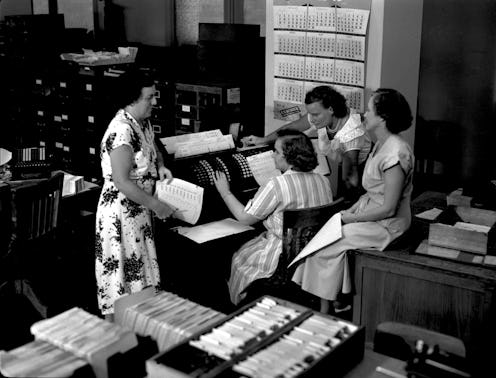News
The Advice You Need To Handle Sexism At Work

We have a knack for dividing women: Women in politics and women in business. Women in STEM and women in Hollywood. But sexism in the workplace doesn't depend on the job title — and Julia Gillard knows it. She may have served as Australia's first female prime minister, but Gillard's awesome advice on handling sexism in the workplace is hardly limited to women on Capitol Hill, or the would-be woman sitting in the Oval Office.
The one-time political pioneer spoke at Fortune magazine's Most Powerful Women Summit on Monday, delivering a much-needed dose of realness. Gillard has never been demure about the sexism she endured while serving as Australia's chief politician; her speech accusing opposition leader Tony Abbott of clear-eyed misogyny has nearly 3 million views on YouTube at this point. So, naturally, many of the questions she received on Monday were variations of: What advice would you give to women in politics? And what about that one American woman in particular, Hillary Clinton?
Gillard, at first, said she had no tips for Clinton, who was a target of sexist ridicule and hatred during her tenure as first lady. It hasn't really gotten easier for Clinton over these last 20 years, but she seems to know how to stick it to her haters with a smile.
But what about us plebes working our way out of the 9-to-5 grind? Well, Gillard had advice for women everywhere and anywhere — whether you're the leader on the campaign trail or an entry-level assistant.
Address The Sexism Early On
Did you just start a new job last week and already your male supervisor is making derogatory comments in front of your cubicle? Or better yet — you're the supervisor, and your male employees are giving you that passive-aggressive eye roll. Call that shit out, Gillard said! (OK, I added that explicit emphasis.)
One thing I absolutely did get wrong about being the first woman to do the job as prime minister, I made the assumption that the maximum reaction ... to having the first female prime minister would manifest in the first few months of doing the job ... would be at its height. ... And then, the more I did the job, I thought the more all of that would go away and the system would normalize, and I would be judged on the job I was doing.
Gillard knows now that's not how it works — the sexist treatment never went away the longer she remained in the position. "If anything happens that's sexist, you have to call it out early, rather than thinking it will all normalize," Gillard continued.
She advised Clinton to address the sexism right now in her campaign so it won't interfere with her future political moves. The same goes for every woman, too — if you let it linger, you better believe it'll not only stick, but be leveraged by your colleagues and opponents in the future.
Don't Be Afraid Of Teachable Moments
Stereotypes, stereotypes, stereotypes. We know they continue to live on, particularly about women in leadership positions, whether prime minister, CEO, lead engineer, project manager... you get the idea. These preconceived notions about women in positions of authority are hard to shake, but minds must be changed so these ideas don't trickle into the future — and harm our daughters.
Gillard said:
ntil we can shed that stereotype that likeability and women and leadership don't go together, we'll be putting baggage on the women leaders who do emerge. ... This is the moment for us to be having deep conversations about how to change it so that daughters in the future [don’t have to face] questions other than those about values and competency and confidence.
"I don’t think people are born with a blinkered gender construct about what they can achieve in the world," Gillard continued. "We stamp that onto them. And we’ve got to pull the stamp away."
Don't Compromise Yourself To Fit The Gender Mold
Perhaps one of the strongest ways to shake off those stereotypes is by not apologizing for or compromising any part of yourself in order to fit society's gender construct. Gillard said she received a lot of criticism during her days as prime minister and Labor Party leader — from being told she was too emotional and needed to "man up" to critics deriding her as a "bitch."
"This issue about women and leadership is a global issue," Gillard said Monday. "Still, somewhere in our brains, is whispering a stereotype that says if a woman is leading, commanding, she has probably given up on ‘female’ traits of empathy, likability; she’s probably a bit hard boiled."
Don't hide your empathy to show your tough, or amend your character to appear more "likable" in the friendly, non-threatening female way. Own it.
Image: Flickr/Kheel Center, Getty Images (3)